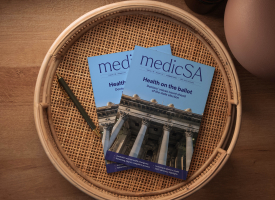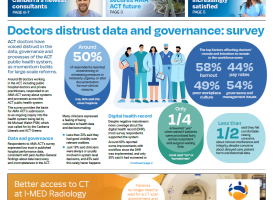Securing safeguards in RN prescriber registration standard
A new registration standard was introduced this week for registered nurses (RNs) who wish to pursue an endorsement to prescribe scheduled medicines.

At first glance, this development may appear to challenge the role of doctors or suggest “scope creep”. However, thanks to sustained AMA advocacy, this standard differs significantly from pharmacist prescribing models developed by state and territory governments without robust and meaningful consultation.
Following years of engagement with the Nursing and Midwifery Board of Australia (NMBA), we secured several key safeguards to ensure this change supports — rather than undermines — doctor-led, team-based models of care that are vital to our health system. There are still issues to work through, and we have been in contact with both the board and the Department of Health, Disability and Ageing to seek clarification on areas of concern.
We participated at every stage of the NMBA’s consultation, consistently raising concerns about the lack of transparency. In our 2023 submission, we made it clear that we could not support RN prescribing based on the information available at the time.
We advocated that any RN prescribing of Schedule 2, 3, and 4 medications must occur within medically-led, delegated team environments — and only under an active prescribing agreement with a medical practitioner.
While not all our concerns were addressed, the NMBA has incorporated several important safeguards.
Under the new model, designated RN prescribers will be able to prescribe scheduled medicines for a limited range of conditions, within their scope of practice, and only under a specific prescribing agreement with an authorised health practitioner.
Key safeguards include:
- a minimum of 5,000 hours of post-initial registration clinical experience within the past six years
- completion of an AQF Level 8 qualification
- accredited education and training programs aligned with predetermined competencies.
- a six-month mentorship with an authorised health practitioner
- a documented protocol for collaboration with an authorised health practitioner (either a nurse practitioner or medical practitioner) via a prescribing agreement.
These safeguards reflect the AMA’s advocacy.
The uptake of RN prescribing will be restricted to certain limited medications and conditions, and under carefully designed prescribing agreements.
From a participating doctor’s perspective, it will be a formal document that defines the roles and responsibilities of the designated RN prescriber and the doctor, as well as the conditions and scope within which the RN can prescribe medicines. The prescribing agreement must be approved by the health organisation/service or employer. This is not a one-size-fits-all approach — it’s individualised. It may also present opportunities for some members to expand nursing roles within their practices.
Importantly, this model is fundamentally different from pharmacist prescribing models being rolled out in some jurisdictions, which allow independent prescribing without appropriate oversight — a model we strongly oppose.
Despite improvements, concerns remain. For example, there is ambiguity around the definition of “authorised health practitioner”. While the standard specifies medical and nurse practitioners, recent webinars have suggested this could include other professionals, such as pharmacists. We have sought urgent clarification from the NMBA and raised this issue with the Department of Health, Disability and Ageing. We do not support pharmacists being the authorised prescriber. Supervising prescribers should be experienced in broad prescribing and be limited to medical practitioners (or nurse practitioners acting within their scope of practice).
We also continue to oppose the decision to include Schedule 8 medicines in the standard. We do not consider that medical practitioners will feel comfortable delegating the responsibility of S8 prescribing. It is important to remember this is not a requirement, and individual doctors retain control of their delegations.
We will also continue to advocate for safeguards to ensure models of care involving delegated RN prescribing remain best-practice and have patient safety front of mind.
It’s also important to note that no RNs currently hold a prescribing endorsement and this will not change immediately. Training programs are yet to be established, and RNs will need to meet several requirements before endorsement is possible. Additionally, changes to the Pharmaceutical Benefits Scheme (PBS) would be required before RN prescribers could access PBS-subsidised medicines.
The AMA will continue to advocate for improvements to the standard and for the preservation of team-based care led by medical practitioners.
For more information, please visit the NMBA website.



